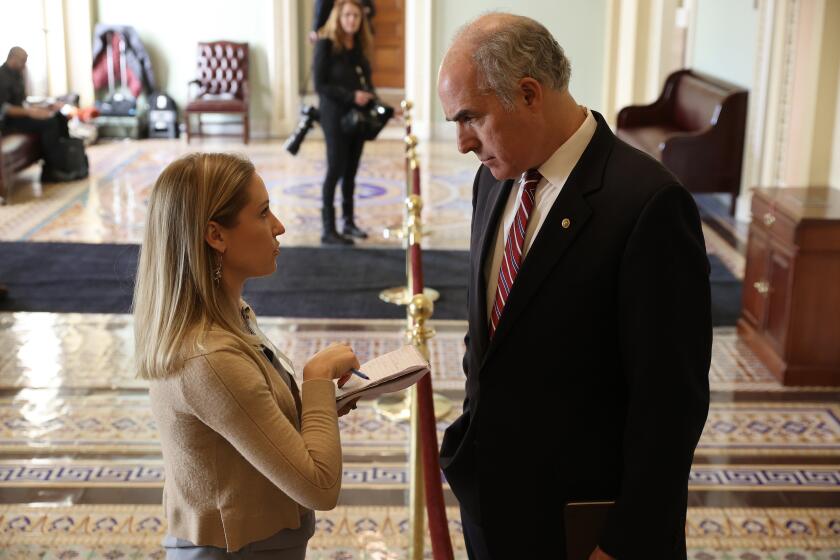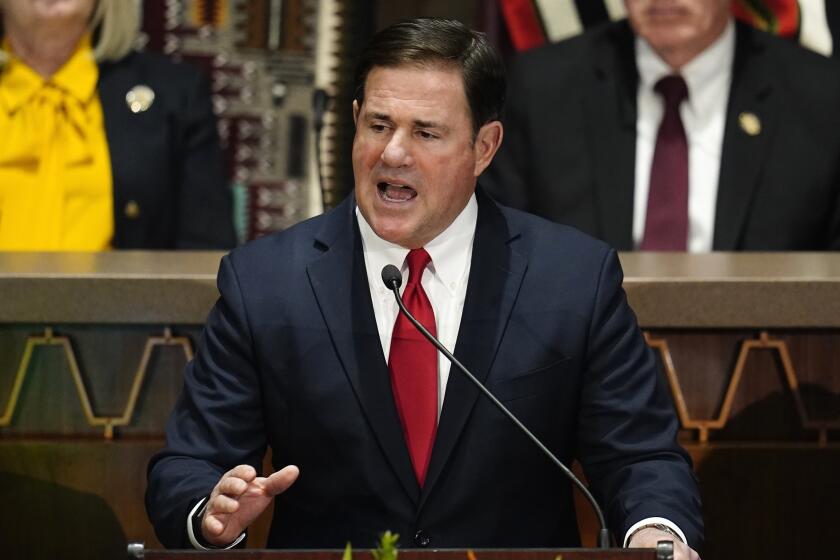‘What so many people told us was impossible’: Progressives promote early midterm success

Eight years ago, Jessica Cisneros was an intern for Texas’ Rep. Henry Cuellar.
Two years ago, she came within 4 percentage points of forcing the veteran Democratic congressman out of office.
And this week, she held her former boss below the threshold necessary to win the district’s Democratic nomination, triggering a May 24 runoff.
“What we’re doing right now is what so many people told us was impossible,” Cisneros, a 28-year-old immigration lawyer, told supporters at a primary night campaign party Tuesday. “And here we are.”
Tuesday’s primaries in Texas, the nation’s earliest, offer the first glimpse into what the midterm election cycle has in store for both parties. As Democrats attempt to maintain their razor-thin majorities in the House and Senate, Cisneros’ strong showing in the 28th District has reignited debate around which wing of the party holds momentum heading into the primary season.
Her campaign represents the kind of story liberal Democrats have sought to share over recent cycles: that progressive policies on everything from healthcare to climate change are popular, even in a diverse district like Cuellar’s, which stretches from the border town of Laredo to San Antonio, one of the fastest-growing cities in the nation.
After left-leaning activists take over, critics decapitate the state party.
Over the last few election cycles, progressives have demonstrated they can topple well-funded and established centrist Democrats, even in parts of the country that don’t seem like strong territory for the far left.
But progressives have yet to prove that they can draw out enough new voters to win general elections in the kind of swing districts where the Democratic establishment prefers to run moderates.
Can a candidate who backs the Green New Deal and “Medicare for all” win a competitive seat in a general election? A handful have come close.
“The narrative going into this election has been that progressives are trying to go too far too fast, that our politics aren’t resonating with Americans,” said Pedro Lira, co-director of the Texas Working Families Party, which endorsed Cisneros and three other congressional candidates who either won their primaries outright or advanced to a runoff. “We are clearly showing in Texas that that’s not true.”
Republicans used the 2021 redistricting process to shore up their incumbents, meaning that only two of the state’s 38 congressional districts are seen as competitive. The seat Cisneros is seeking is one of them. Following Tuesday’s results and the prolonged Democratic primary, election forecasters at the Cook Political Report rated the seat a toss-up.
The other Texas Democrat to earn the endorsement of progressive leaders Sen. Bernie Sanders (I-Vt.) and Rep. Alexandria Ocasio-Cortez (D-N.Y.) was Greg Casar, a former Austin city councilman and tenants’ rights organizer, who won a primary in a heavily Democratic district.
Few victories would galvanize progressives like taking down Cuellar, one of a handful of conservatives left in the House Democratic Caucus.
The race is also a key one for abortion rights groups. Cuellar is the last Democrat in the House opposed to abortion rights. Last year he was the sole Democrat to join Republicans in voting against a bill to prevent states from restricting access to abortions.
The Senate fails to advance a bill to legalize abortion nationwide.
While Cuellar has attempted to paint Cisneros as too liberal for the district, particularly on border security and oil and gas issues key to the region, Cisneros has argued that Cuellar is out of step due to his conservative stances on abortion, immigration and gun control.
In recent weeks, Cisneros leaned into a political gift in the form of an FBI raid on Cuellar’s home and office. While Cuellar has not been accused of any crimes and has said the investigation will reveal no wrongdoing on his part, he pulled back on public campaigning after the news broke. Though the investigation hasn’t helped him, it wasn’t enough to hand Cisneros a victory, either: Cuellar took 48.4% of the vote to her 47%.
“The runoff is going to be hard-fought and really close,” said Ross Morales Rocketto, co-founder of Run for Something, a political action group that recruits progressive candidates. “I think people underestimate Henry Cuellar and the connections he has with the communities in south Texas.”
For Democrats, the intraparty conflict often presents itself as a David vs. Goliath contest between an entrenched incumbent and an upstart progressive. In firmly Democratic districts, progressives who beat more moderate members of their party have gone on to easily win the general election, like Ocasio-Cortez in New York and Reps. Ayanna Pressley and Marie Newman in Massachusetts and Illinois.
Moderates, however, argue that there’s a difference between nominating a Casar in the liberal enclave of Austin, and, potentially, a Cisneros in the combined rural, urban and border communities that make up Texas’ 28th District.
“If Cisneros wins her runoff, it is not at all clear that she will be able to win the general election,” said Matt Bennett, a co-founder of the centrist Democratic think tank Third Way.
“We hope she does; we would be very strongly behind her,” he added. “But there is a pretty bad track record for candidates endorsed by the far left in swing general elections.”
Bennett pointed to two progressives — Kara Eastman of Nebraska and Dana Balter of New York — who beat moderate Democrats in 2018 primaries but lost their general elections as well as rematches in 2020.
Progressive groups like Our Revolution and Justice Democrats “have never, ever flipped a seat — not once ever,” said Bennett. “That’s what the name of the game here is ... creating majorities and beating Republicans in tough districts.”
Arizona Gov. Doug Ducey decided not to run for Senate, marking a setback for McConnell’s efforts to win back the chamber for Republicans.
Not only have progressives failed to flip seats, centrists say, but the policies they promote can also be liabilities for moderates running in competitive seats.
Last year Third Way launched Shield PAC, an effort to protect moderate Democrats running in purple districts from being tied to progressive policies they don’t support. Former centrist Democratic Reps. Xochitl Torres Small of New Mexico, Joe Cunningham of South Carolina and Kendra Horn of Oklahoma signed on as advisory members.
The three flipped Republican-held seats in 2018 but lost their reelection bids in 2020 after GOP opponents claimed they supported progressive policies like the Green New Deal and Medicare for all.
President Biden, in his State of the Union speech on Tuesday, offered a blueprint to candidates fighting to plant their flag in the moderate camp: He rejected calls to “defund the police” by ad-libbing, “fund them, fund them,” and called for more secure borders, while glossing over or ignoring progressive concerns like climate change, abortion rights and student loan debt.
“I think he was trying to model behavior here for Democrats and say to them, ‘Look, you have got to articulate a very clear position on these issues,’” Bennett said of the president’s effort to stake out claims to stances that appeal to more centrist voters.
Still, for progressives in other races, the results in Texas renewed hope that their theory of elections is correct — that strong grassroots movements centered around their favored policies can draw out enough voters to win primaries and general elections, even in the toughest races.
“It was encouraging to see that the movement that we are building in places like Kentucky — but also places like Texas — they’re gaining support,” said Charles Booker, a progressive Democrat seeking to unseat Republican Sen. Rand Paul in Kentucky. “We’re certainly taking some inspiration in our own right.”
This is Booker’s second Senate campaign, having lost the 2020 Democratic nomination to former Marine fighter pilot Amy McGrath. McGrath’s supporters had argued that as a former congressional candidate with a deep war chest, she was the best candidate to take a run at then-Senate Majority Leader Mitch McConnell. They also argued that some of Booker’s policy positions, like support for the Green New Deal in a coal-producing state, put him out of touch with voters.
Booker, who had only ever won a state legislative seat, entered the 2020 race after McGrath had already won the backing of the party apparatus.
But he experienced a surge in support over his strong stance on racial justice, including his presence at Black Lives Matter protests, and lost the primary by less than 3 percentage points.
McGrath went on to lose by nearly 20 points to McConnell, despite outraising him by $30 million. Kentucky has not sent a Democrat to the Senate in three decades.
Booker has cleared the Democratic field this time, but trails Paul in fundraising and polls.
He says that if more Democrats invested in his campaign instead of questioning whether he’s a viable candidate, it could make the difference.
“The question that some will ask,” he said, “is ‘Can you win as a progressive?’... What you’re actually asking is ‘Can you win without help?’”
More to Read
Get the L.A. Times Politics newsletter
Deeply reported insights into legislation, politics and policy from Sacramento, Washington and beyond. In your inbox three times per week.
You may occasionally receive promotional content from the Los Angeles Times.














